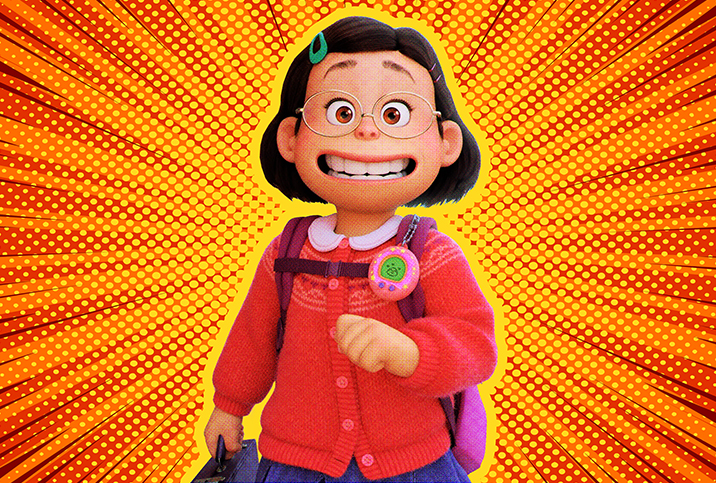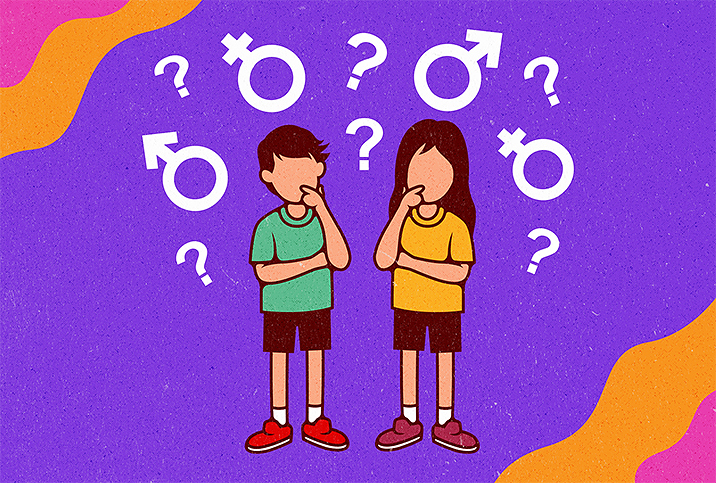'Turning Red' Takes on Periods and Adolescent Sexuality

"Turning Red," the first Pixar animated feature directed solely by a woman, Domee Shi, made headlines in March 2022 for breaking taboos with its daring portrayal of puberty, menstruation and adolescent sexuality. The film centers on Mei Lee, a 13-year-old Chinese-Canadian girl who notices she metamorphoses into a giant red panda every time she has strong emotions—in part, an allegory for her period. The movie was hailed by many people in the Asian diaspora community as a landmark film that breaks stereotypes and pushes forward conversations on traditionally unspoken themes.
Opening up about these topics is especially relevant as a 2021 study published in Affilia: Journal of Women and Social Work found Asian women are overly sexualized, objects of racialized violence and sexual harassment, and subjected to neocolonialist attitudes over their bodies.
We spoke to Anne-Claudie Beaulieu, a sexologist who practices at Sexualis in Montreal, about the film's depiction of Asian female adolescent sexuality and how to talk to your Asian daughter about puberty.
As a sexologist, what did you think of the movie?
Beaulieu: This movie was great for many reasons. The aspect of family was really depicted well. It nailed the dynamic of going through puberty, changes and high school as a young teenager who just wants more freedom and more autonomy. The contrast between the teen and her more protective and very caring mother was very interesting to watch because it was very realistic. I think it's not necessarily a relationship dynamic we see much in popular media, especially when we factor in periods and their accompanying bodily changes.
I liked how Shi represented the mother's reaction to her daughter's first period. She gets over her initial big shock and becomes very supportive and willing to talk about it. The help she offers her daughter shows she has a very healthy and positive view of menstruation. She wanted to provide her child with information, open a dialogue and offer different options for managing this big change in her life.
What did you think of the mother's response to puberty?
If we're talking about an ideal response, some little tweaks and improvements could be made. But overall, the mother has a very supportive and positive response to the situation.
Often for many parents, the changes their kids go through with puberty can be very surprising because they think their kids are going to remain kids forever. So when those changes actually happen physically, it can be pretty surprising. It's important for parents to remember not everyone has puberty at the same time. Some children have bodies that develop a little earlier but still have thoughts and a personality that is younger than what their bodies look like. The dichotomy between those physical changes and the inner development of the teenager can be out of sync, which can increase the parents' shock.
The movie could have been even better if the mother used the real terms when she refers to anatomy and biology. Instead, she makes a reference to a flower blooming to reference what was happening to her daughter. But I think normalizing the real words and describing more explicitly what's happening can be very reassuring for the teenager. For example, instead of asking Mei, "Did your flower bloom?" the mom could have said, "Are there blood stains in your underwear? How do you feel? Do you have cramps?"
Another thing that can be surprising to some parents, but is actually very helpful, is to talk about those changes with your child before they happen. That way, there are no surprises for the child regardless of when puberty starts for them, which for some can be as early as 8 years old and for others can be as late as 16 years old.
Talking about those changes with your child before they happen allows them to identify and acknowledge what is happening when the time comes instead of being caught off-guard. This not only applies to periods but also to other stuff, such as spontaneous erections throughout the night for people who have penises. Not knowing these things are normal can be scary or worrying for a teenager. So having discussions about those changes before they happen can really help normalize them.
What did you think of the depiction of an Asian mother and daughter tackling the topic of sexuality?
It was very powerful to see representation. To see it makes it exist and makes it possible to use that model to open a discussion about Asian female sexuality. I can imagine a lot of families who saw the movie were a little shy or shocked by this theme. But it's a great starting point to open discussion.
It was very bold to portray the mom as perfectly comfortable talking about sexuality at the end of the movie. It already makes a big difference because it's not an easy topic for a lot of people in Asian communities. So having an Asian mother who's comfortable and supportive of her daughter's sexual development and who really tries to connect with her daughter is a very novel depiction of the Asian mother-daughter relationship. We even see the mom's comfort level reach an extreme when she goes to Mei's school to remind her daughter she forgot her pads, something which greatly embarrassed the teenager!
What do you hope mothers and daughters who are watching the movie take away from it?
I hope mothers understand the importance of normalizing puberty, because no matter what, it will happen. The movie shows they can provide support within the limits of their own comfort instead of leaving their daughters to experience it alone in the dark. Mei's mother prepares a box with materials to help with periods, which is a great way mothers can support their daughters if talking about the topic is a little more uncomfortable. Another great way of supporting teenage girls is for parents to provide information, such as a sex education book, if they're not comfortable having a discussion. Parents can provide support in many different forms. The trick is to find the most accessible and comfortable form of support for you.
Parents normalizing puberty changes and wanting to open a dialogue about it sends the message to their teenager that it doesn't have to be taboo or secret. It lets their teenager know they can reach out if they need support or that it is acceptable to want to learn more about it. Understandably, sex education is not a comfortable topic for a lot of parents, but there's often the misconception that parents need to talk about their personal experiences to provide sex education. But providing support can also mean orienting the teenager towards comprehensive and official sex education references—such as books, educational videos, podcasts or the school nurse—and does not require parents to disclose their personal experiences.
The film shows the normal discomfort teenagers often feel when they go through puberty. I think, as a parent, it's important to understand that those topics can be very confronting for their children or teenagers who are not necessarily ready to tackle them. So it's important for parents to respect their children's rhythm and try to understand where the discomfort comes from. This movie really provides great points to ask ourselves questions about puberty, whether you are a child, a teenager or a parent.


















